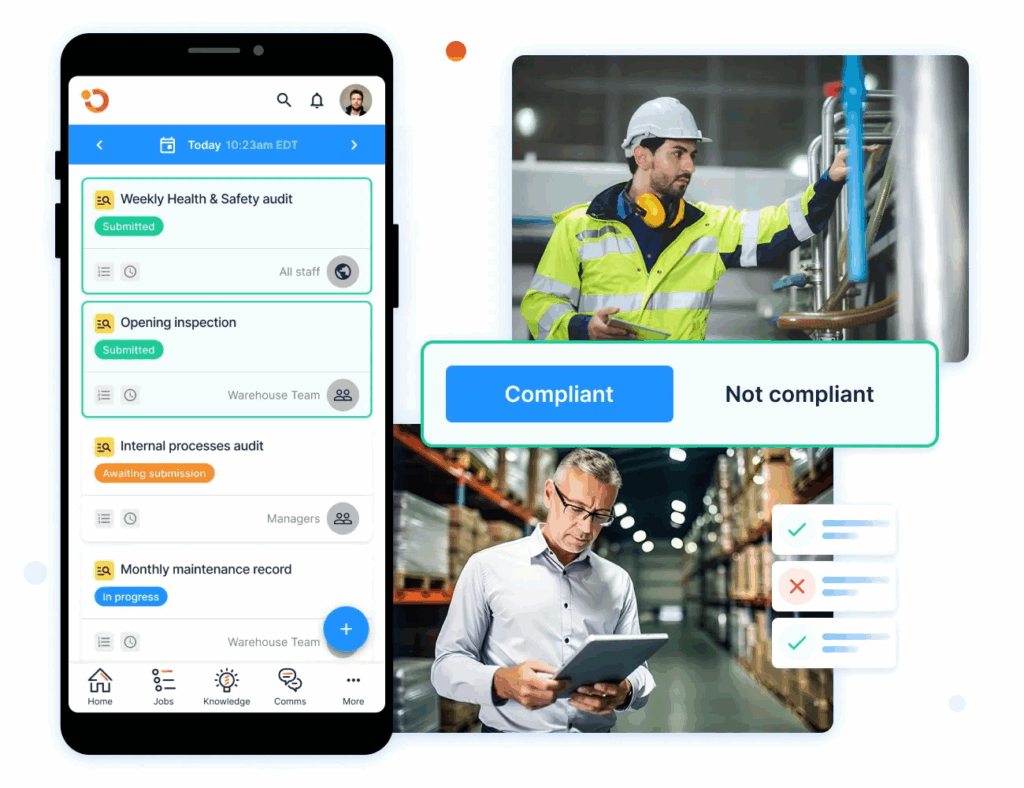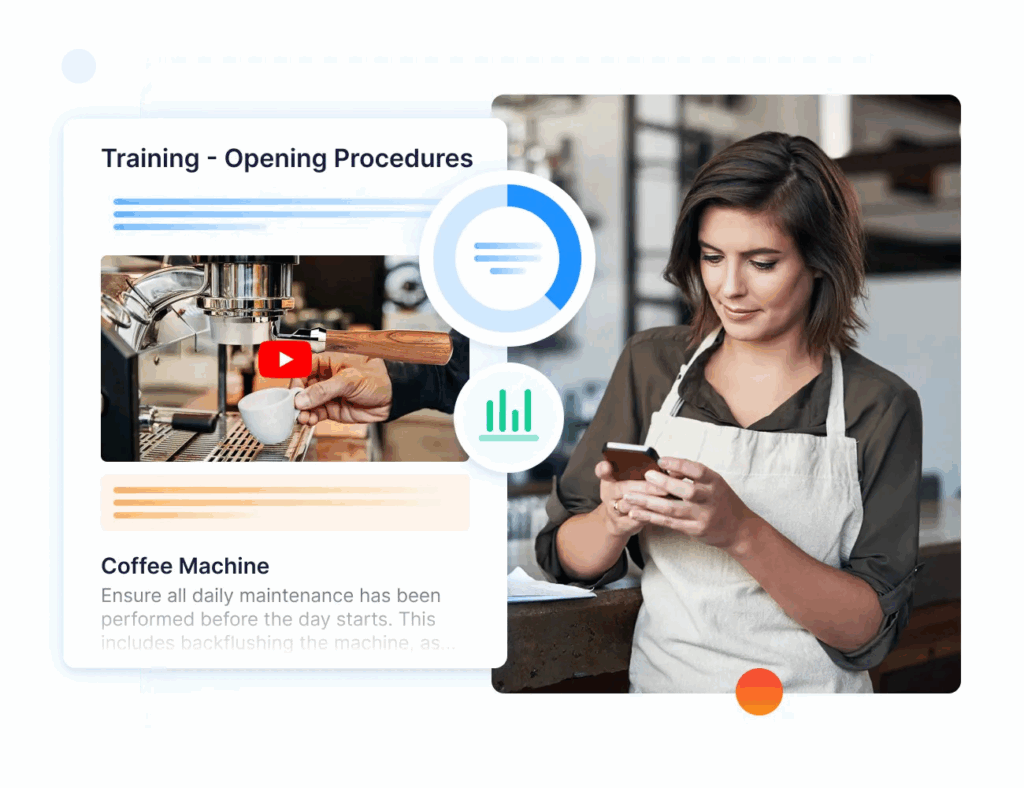2026 Hospitality Compliance: Meeting Standards, Risks & More
Key Takeaways
- Hospitality compliance covers food safety, health regulations, alcohol licenses, and employee safety standards that every location in your multi-unit business must follow.
- Skip compliance and you face fines up to $2 million, license suspensions, lawsuits, and shutdowns that destroy multi-location operations.
- Essential compliance areas include HACCP food safety protocols, alcohol licensing, fire safety certifications, and staff training documentation.
- Digital compliance platforms, like Operandio, help automate temperature checks, track staff certifications, and ensure consistent standards across multiple hospitality locations.
One missed temperature log. One untrained bartender. One failed ecosure inspection result slammed against the wall.
That’s it. That could be all it takes to close your doors or damage your restaurant’s reputation. Hospitality compliance in 2026 means you navigate a maze of regulations that change by city, county, and state — from food safety compliance to customer service requirements.
This guide explains what compliance means, where violations are most severe, and how top multi-unit brands stay ahead of inspectors.
You’ll identify the areas that cause the most headaches and discover systems that keep all your locations compliant without overwhelming you with paperwork.
What is Hospitality Compliance?
Hospitality compliance means you follow every legal, safety, and health standard that governs your food service, hotel, or entertainment business.
For most multi-unit operators, this means every single location meets identical standards for food safety, alcohol service, health codes, fire safety, and employee protection.
Compliance creates consistent guest experiences while it protects your business from lawsuits and shutdowns.
Risks And Penalties Of Non-Compliance
Non-compliance in hospitality can result in fines exceeding $2 million, temporary or permanent license suspensions, and forced business closures.
Here is a breakdown of the potential fines and penalties for hospitality non-compliance:
#1: Financial Penalties and Fines
Compliance failures can quickly escalate into crippling financial hits. Food safety violations, health code breaches, or alcohol licensing issues often result in steep fines, revenue losses, and even license suspensions that can halt operations altogether.
For multi-unit operators, the stakes rise higher: one violation at a single location can trigger investigations across the entire chain, multiplying both the cost and the damage to brand reputation.
#2: License Suspension and Business Closure
Regulators can seize your licenses immediately for serious violations.
Food service licenses, alcohol permits, and entertainment licenses vanish within days of major infractions. For multi-location businesses, lost licenses mean zero revenue at affected properties, while fixed costs continue to accumulate.
Recovery from license suspension takes months of remediation, staff retraining, and regulatory approval before you can reopen.
#3: Legal Liability and Lawsuits
Non-compliance opens you up to customer injury claims, foodborne illness lawsuits, and employment violations.
Personal injury settlements resulting from safety violations often exceed $100,000, while foodborne illness cases frequently escalate into class-action lawsuits that affect multiple locations. Employment law violations result in additional legal costs and increased damage awards.
Types of Hospitality Compliance
Understanding these categories helps prioritize resources and develop comprehensive compliance strategies that are tailored to specific needs.
Type #1: Food Safety and HACCP Compliance
Every piece of food and every drink you serve must meet safety standards for preparation, service, and storage.
HACCP (Hazard Analysis and Critical Control Points) protocols require the documentation of temperature checks, staff certification records, and regular maintenance logs for equipment.
Multi-unit operations must maintain consistent food safety standards across all locations, including supplier verification, allergen management, and procedures for preventing contamination.
You need temperature logs, cleaning schedules, and staff certifications documented and ready for health inspections.
Type #2: Alcohol Licensing and Service Regulations
Businesses that serve alcohol or offer entertainment must comply with local licenses that vary widely by jurisdiction.
Alcohol service requires proper licenses, staff certification in responsible beverage service, and age verification procedures. Many locations mandate specific training for spotting intoxicated customers and preventing over-service situations.
Entertainment venues face additional requirements for noise levels, capacity limits, and security protocols that must be consistently maintained across all hours of operation.
Type #3: Health and Safety Regulations
Proper safety protocols, regular inspections, and appropriate staff training prevent accidents, injuries, and hazardous incidents.
Fire safety systems require regular testing, emergency evacuation procedures necessitate staff training, and workplace safety standards necessitate constant monitoring. Multi-unit operations must coordinate safety inspections across all properties while they maintain centralized documentation for regulatory review.
Type#4: Employment Law Compliance
Rising costs and staff shortages in 2026 intensify the pressure to maintain employment law compliance while managing workforce challenges.
Wage and hour regulations, break requirements, and scheduling laws vary by location but must be consistently applied. Fair scheduling legislation, minimum wage updates, and overtime calculations require precise documentation and payroll management across all properties.
How to Meet Hospitality Compliance Standards
Successful compliance requires systematic approaches that scale across multiple locations while they maintain local regulatory requirements. Effective compliance management balances standardization with location-specific adaptations.
#1 Implement Comprehensive Staff Training Programs
Regular training ensures that your employees understand and consistently apply compliance requirements. Food safety certification, alcohol service training, and emergency response procedures require constant reinforcement through documented sessions.
Multi-unit operators benefit from centralized curricula that adapt to location-specific rules while preserving brand standards.
Platforms like hospitality training apps simplify delivery, while dedicated modules such as allergen awareness training ensure your team meets specialized requirements.
Pro tip: Schedule monthly compliance training sessions and maintain digital records of staff certifications to streamline regulatory inspections and reduce violation risks.
#2 Establish Regular Monitoring and Documentation Systems
Systematic monitoring prevents compliance failures before they trigger regulatory violations.
Temperature logs, cleaning schedules, equipment maintenance records, and safety inspection reports require consistent documentation across all locations. Digital systems enable real-time monitoring and alert management when compliance metrics fall outside acceptable ranges.
Create standardized checklists for daily, weekly, and monthly compliance tasks that ensure nothing falls through operational cracks.
#3 Conduct Internal Compliance Audits
Regular internal audits highlight risks before regulators do. Schedule quarterly reviews that cover every category, from food safety to employment law. Internal audits should mirror official inspections, allowing your team to demonstrate readiness with confidence.
Rotate audit personnel between sites to maintain objectivity in evaluations and encourage the sharing of best practices across your operation. This improves accountability and overall hospitality productivity at scale.
#4 Maintain Current Regulatory Knowledge
Subscribe to regulatory updates from local health departments, alcohol licensing authorities, and employment law services. Assign compliance responsibility to specific team members who monitor regulatory changes and coordinate implementation across all locations.
Build relationships with local regulatory officials to clarify requirements and receive advance notice of policy changes that affect your operations.
Hospitality Compliance Technology
Digital solutions streamline compliance tracking while reducing human error risks.
Technology #1: Digital Compliance Management Platforms

Comprehensive compliance platforms centralize documentation, automate monitoring tasks, and provide real-time reports across multiple locations.
These systems track staff certifications, schedule training reminders, and generate compliance reports for regulatory reviews. Integration capabilities connect temperature sensors, point-of-sale systems, and employee management tools into unified compliance dashboards.
Operandio specializes in hospitality compliance management, offering automated temperature monitoring, staff training tracking, and audit trail documentation designed explicitly for multi-unit food service operations.
Technology #2: Automated Temperature Monitoring Systems

IoT technology revolutionizes compliance monitoring through automated data collection and real-time alert systems.
Wireless temperature sensors eliminate the need for manual logging while providing continuous monitoring of refrigeration units, cooking equipment, and food storage areas.
These systems generate automated compliance reports and trigger immediate alerts when temperatures exceed safe parameters.
Technology #3: Staff Training and Certification Platforms

Hospitality digital learning management systems deliver consistent training content while tracking individual progress and certification status.
These platforms customize training content for specific roles, locations, and regulatory requirements, while maintaining centralized oversight of compliance education. Automated reminders ensure staff complete required certifications before expiration dates.
Technology #4: Point-of-Sale Integration for Compliance Tracking
Modern POS systems integrate compliance features that track alcohol sales, monitor transaction patterns, and generate reports that comply with regulations.
Age verification alerts, transaction limits, and automated reporting reduce compliance risks while they streamline daily operations. Integration with staff training systems ensures only certified employees can process regulated transactions.
Challenges in Hospitality Compliance
Multi-unit operations face additional complexity as they strive to maintain consistent standards across diverse locations.
Challenge #1: High Staff Turnover and Training Costs
Labor shortages and high turnover rates create ongoing challenges in maintaining trained, compliant staff across hospitality operations.
New employee training requires significant time investment, while experienced staff departures create knowledge gaps in compliance procedures.
Multi-unit operations struggle to maintain consistent training quality across locations while managing turnover costs.
Pro tip: A proper wellbeing support keeps employees motivated and boosts productivity.
Jo Lynch, Director at KAM, shared insights from fresh industry research:
“Motivated, engaged staff are brilliant at upselling. If an employee feels they have strong wellbeing support, 90% say that would improve customer experience and retention.”
So raising salaries, keeping communication clear, and recognizing staff for good work directly improve the quality of service they deliver.
Challenge #2: Varying Local Regulations Across Locations
Multi-unit hospitality businesses navigate different regulatory requirements in each operating jurisdiction.
Maintaining location-specific compliance while you preserve operational consistency requires sophisticated management systems and local expertise.
Challenge #3: Technology Implementation and Staff Adoption
Implementing new compliance technology presents several challenges, including significant upfront costs, training expenses, and potential employee resistance to system changes.
Staff members who are comfortable with manual processes may resist digital compliance systems, while training costs increase across multiple locations.
Challenge #4: Resource Allocation and Cost Management
Rising operational costs pressure hospitality businesses to balance compliance investments with profitability requirements.
Compliance technology, staff training, and regulatory consulting expenses compete with other operational priorities for limited budget resources.
Multi-unit operations must justify their compliance spending while demonstrating a return on investment through reduced risk of violations and operational efficiency gains.
Make Hospitality Compliance Easy with Operandio
Leading hospitality brands rely on digital platforms that automate compliance, centralize records, and enforce consistent standards across every location.
With the right technology, compliance shifts from a constant worry to a decisive advantage.
Operandio makes that shift possible by protecting your inspection scores, cutting admin costs, and maintaining operational standards. Its digital hospitality checklists simplify compliance and improve service by keeping teams aligned every shift.


